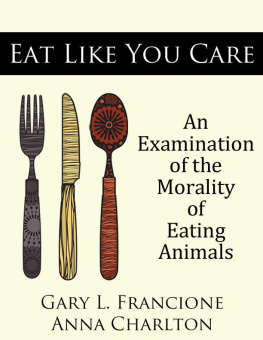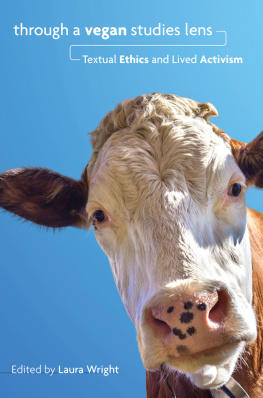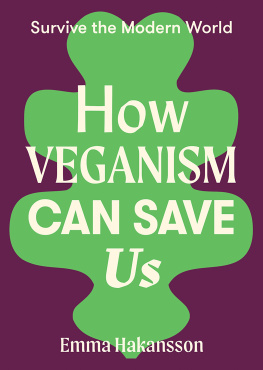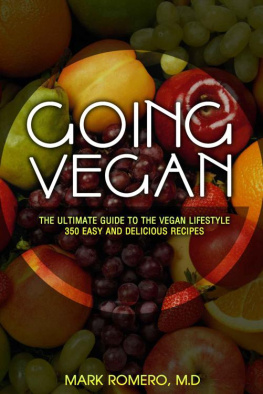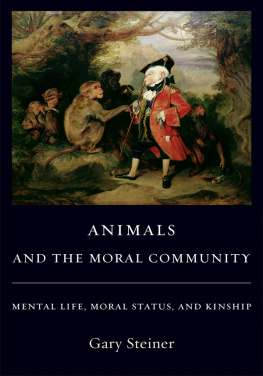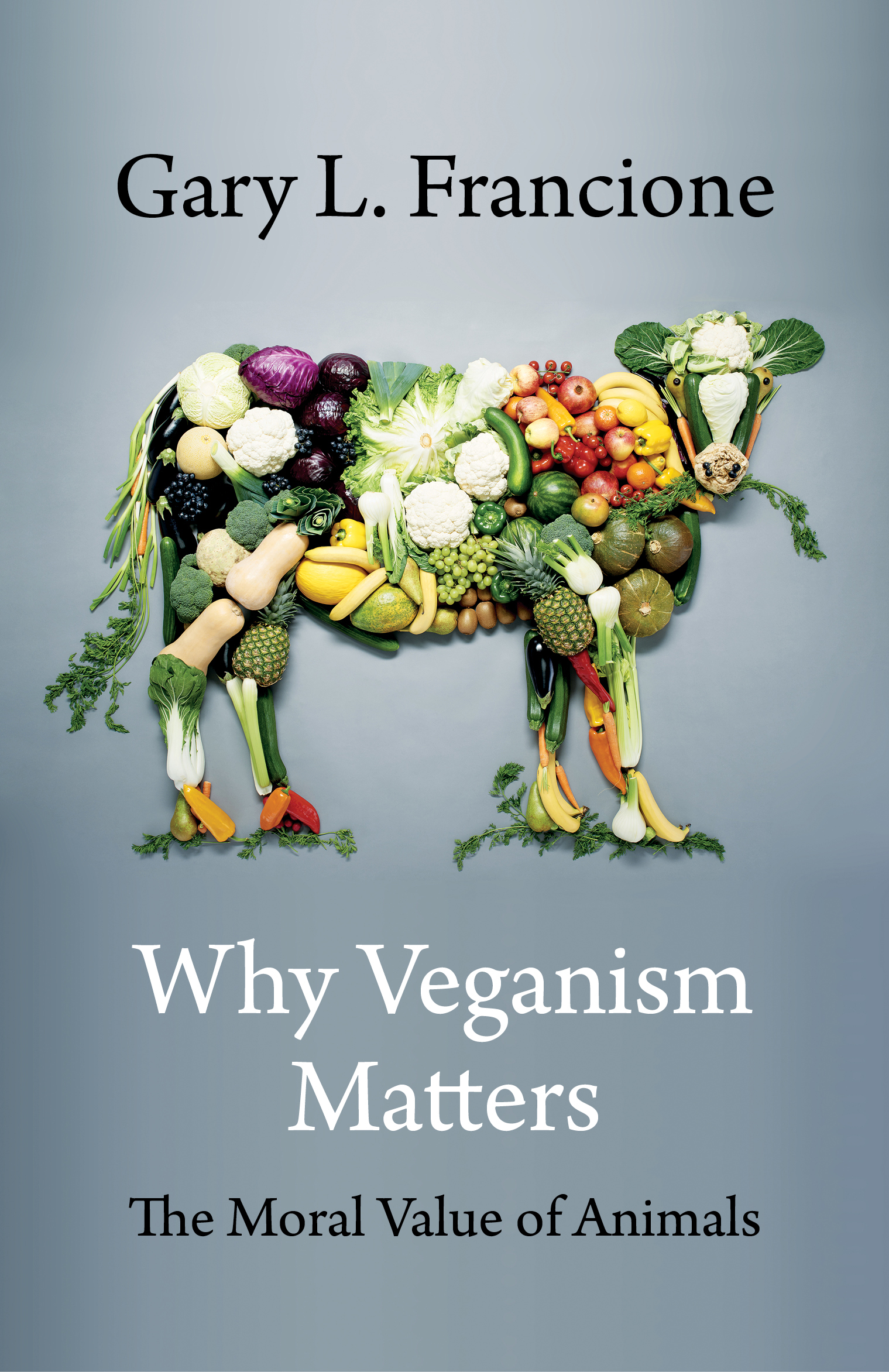Contents
Guide
Pagebreaks of the print version
Why Veganism Matters
CRITICAL PERSPECTIVES ON ANIMALS
CRITICAL PERSPECTIVES ON ANIMALS: THEORY, CULTURE, SCIENCE, AND LAW
Series Editor: Gary L. Francione
The emerging interdisciplinary field of animal studies seeks to shed light on the nature of animal experience and the moral status of animals in ways that overcome the limitations of traditional approaches. Recent work on animals has been characterized by an increasing recognition of the importance of crossing disciplinary boundaries and exploring the affinities as well as the differences among the approaches of fields such as philosophy, law, sociology, political theory, ethology, and literary studies to questions pertaining to animals. This recognition has brought with it an openness to rethinking the very terms of critical inquiry and the traditional assumptions about human being and its relationship to the animal world. The books published in this series seek to contribute to contemporary reflections on the basic terms and methods of critical inquiry by focusing on fundamental questions arising out of the relationships and confrontations between humans and nonhuman animals, and ultimately to enrich our appreciation of the nature and ethical significance of nonhuman animals by providing a forum for the interdisciplinary exploration of questions and problems that have traditionally been confined within narrowly circumscribed disciplinary boundaries.
The Animal Rights Debate: Abolition or Regulation?, Gary L. Francione and Robert Garner
Animal Rights Without Liberation: Applied Ethics and Human Obligations, Alasdair Cochrane
Experiencing Animal Minds: An Anthology of Animal-Human Encounters, edited by Julie A. Smith and Robert W. Mitchell
Animalia Americana: Animal Representations and Biopolitical Subjectivity, Colleen Glenney Boggs
Animal Oppression and Human Violence: Domesecration, Capitalism, and Global Conflict, David A. Nibert
Animals and the Limits of Postmodernism, Gary Steiner
Being Animal: Beasts and Boundaries in Nature Ethics, Anna L. Peterson
Flight Ways: Life and Loss at the Edge of Extinction, Thom van Dooren
Eat This Book: A Carnivores Manifesto, Dominique Lestel
Beating Hearts: Abortion and Animal Rights, Sherry F. Colb and Michael C. Dorf
The Wake of Crows: Living and Dying in Shared Worlds, Thom van Dooren
Why Veganism Matters
THE MORAL VALUE OF ANIMALS
Gary L. Francione

Columbia University Press
New York

Columbia University Press
Publishers Since 1893
New YorkChichester, West Sussex
cup.columbia.edu
Copyright 2020 Gary L. Francione
All rights reserved
E-ISBN 978-0-231-55320-9
Library of Congress Cataloging-in-Publication Data
Names: Francione, Gary L. (Gary Lawrence), 1954 author.
Title: Why veganism matters : the moral value of animals / Gary L. Francione.
Description: New York : Columbia University Press, 2020. | Series: Critical perspectives on animals: theory, culture, science, and law | Includes bibliographical references and index.
Identifiers: LCCN 2020020832 (print) | LCCN 2020020833 (ebook) | ISBN 9780231199605 (hardback) | ISBN 9780231199612 (trade paperback)
Subjects: LCSH: Animal welfare. | VeganismMoral and ethical aspects. | Animal rights.
Classification: LCC HV4708 .F7276 2020 (print) | LCC HV4708 (ebook) | DDC 179/.3dc23
LC record available at https://lccn.loc.gov/2020020832
LC ebook record available at https://lccn.loc.gov/2020020833
A Columbia University Press E-book.
CUP would be pleased to hear about your reading experience with this e-book at .
Cover design: Milenda Nan Ok Lee
Cover image: Rein Jannson / Adobe Stock
Dedicated to all of those who believe that animals matter morally but who are not yet vegans. There are so many of you that, were you to embrace veganism, we could bring about a revolution of the heart and change the world for nonhuman animals.
Contents
Many Thanks to Wendy Lochner, my editor at Columbia University Press, and to all of her colleagues, including my copyeditor, Robert M. Demke, Lowell Frye, Susan Pensak, and Milenda Nan Ok Lee, who designed the cover.
I very much appreciate the comments that I received from David Benatar, Daniel Came, Cora Diamond, Joy Knight, Dave Langlois, Vance Lehmkuhl, and Frances McCormack. I also acknowledge my colleagues in philosophy at the University of Lincoln (UK)Daniel Came, Mark Hocknull, Olley Pearson, Brian Pitts, and Ralph Weirand thank them for their support and encouragement of my work.
I am beyond grateful to my life partner, Anna Charlton, who has been with me every step of the way over the past almost forty years of my involvement in this issue. We teach classes together on animal ethics and animal law, we are coauthors on a number of things, and we were codirectors of the Animal Rights Law Clinic at Rutgers University, the first such entity of its kind at a U.S. university, where students earned academic credit for working with us on legal cases that involved animal issues. Anna read the manuscript multiple times and her comments were invaluable. The ideas herein are as much hers as mine.
Finally, I must acknowledge my nonhuman familyMaya, Duncan, Maggie, Daphne, and Finlaywho sat with me while I wrote this. (George was with us when I started the book but he has since left us and we miss him terribly.) They, and the approximately twenty other rescued canines and several hamsters who have shared our home and who have passed on, are a constant reminder of the moral reality of nonhuman personhood and of the absurdity and arrogance transparent in any claim that sentient nonhumans do not have an interest in continuing to live or that they would lose nothing of value if they were to be killed.
Do we have a moral obligation to be vegan?
Many people, including those who think that animals matter morally, are mystified as to why some people are vegan and, for moral reasons, do not eat, wear, or otherwise use animals. They think of veganism as an extreme position. They certainly do not think that they have a moral obligation to become a vegan.
In this book, I am going to argue that, if you think that animals matter morally, then you are committed to being a vegan. There is nothing extreme about it. Indeed, I am going to argue that what is extremein the sense of being extremely inconsistentis to believe that animals matter morally and yet not be vegan.
Notice that I said, if you think that animals matter morally, then you are committed to being a vegan. Let me be crystal clear from the outset that this book is addressed to those who agree that animals matter morally. So if you are of the view that animals have no moral value and that they are not the sorts of beings to whom we can have moral obligations, then you probably should not bother reading further because I am not going to try to convince you otherwise. I am going to argue that, if you are one of the many people who think that animals matter morally, then you are committed to not using animals exclusively as resources. You are morally obligated to be a vegan.


